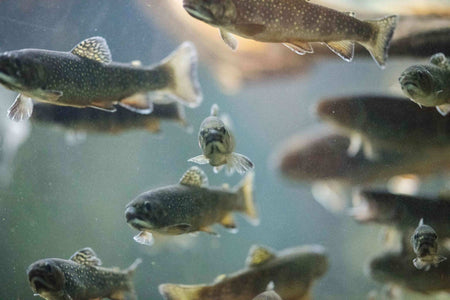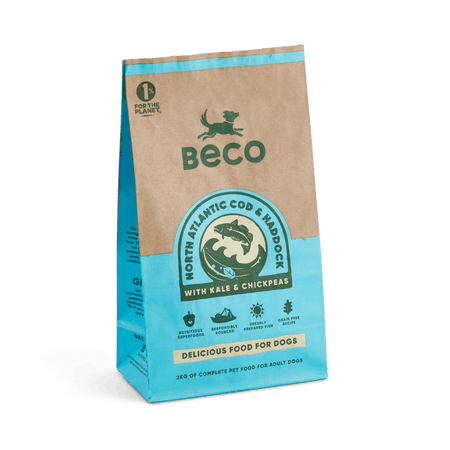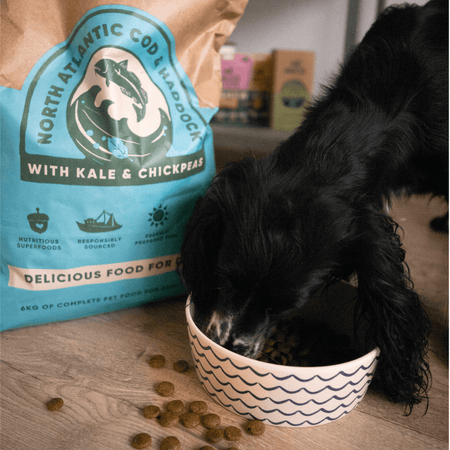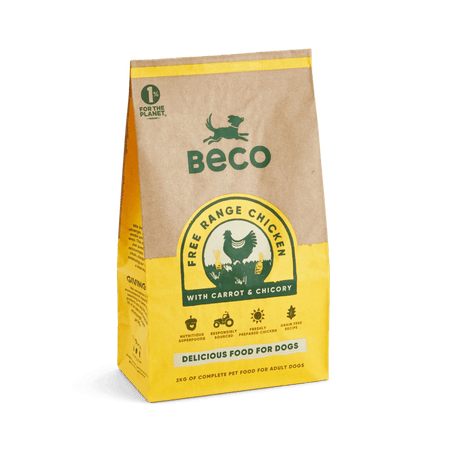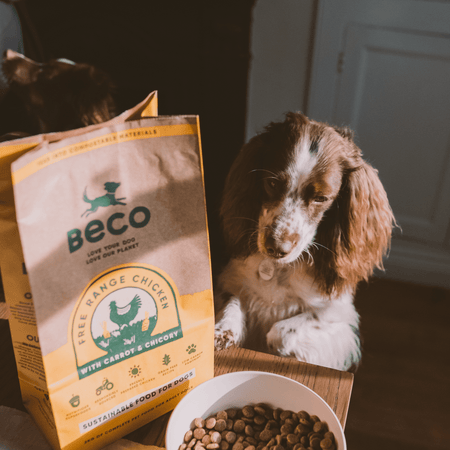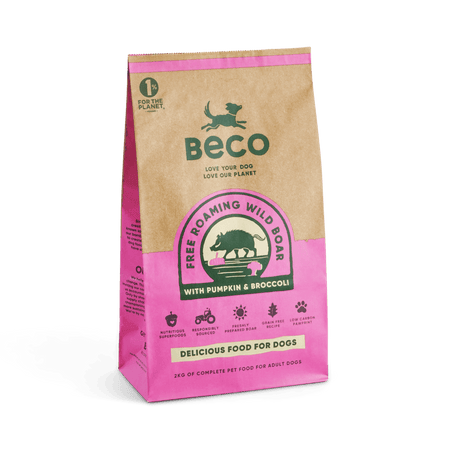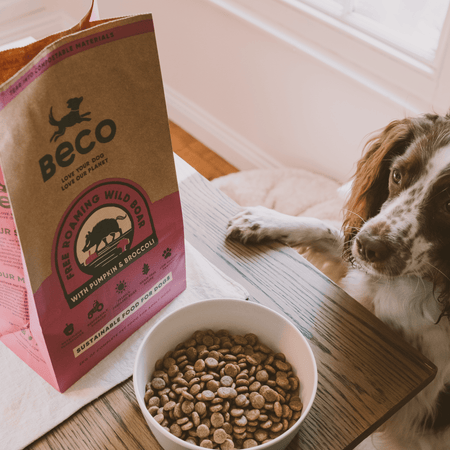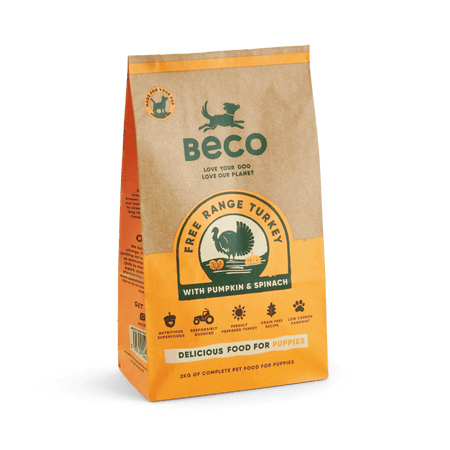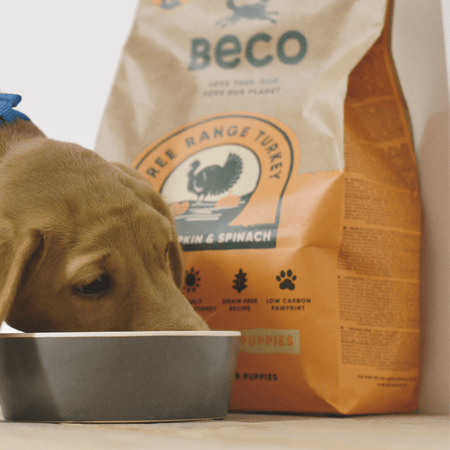Cod (and many other fish types) can most definitely be eaten by dogs, provided that they’re thoroughly cooked first. Fish is rich in many nutrients which are beneficial to dogs, and cod (along with salmon, tuna and whiting) provides dogs with a great animal protein for their diet. In this blog, we’ll be looking at how best to give your dog cod, as well as some of its major benefits.
Is cod good for dogs?
In short, yes! A readily available, low-fat source of protein, cod is known to help with the following:
-
Improving heart health.
-
Reducing the risk of strokes.
-
Potentially reducing the likelihood of cancer.
Helping control high blood pressure.
These health benefits extend beyond humans to dogs, too! Another major benefit of eating cod is its high concentration of omega-3 fatty acids. Whilst our brains might jump to negative connotations when we hear the term ‘fatty acid’, omega-3 is actually very helpful to both humans and dogs, alike. Particularly, because neither humans nor dogs are able to produce omega-3 fatty acids in their bodies, themselves.
How does omega-3 help dogs?
For dogs, omega-3 fatty acids are thought (in moderate quantities, at least) to:
Improve coat and fur condition.
Reduce joint stiffness and improve mobility.
Improve heart condition.
Promote faster wound and injury healing.
Support greater immune system health.
Cod is a great source of omega-3 fatty acids whilst still being very healthy; this is because - although it’s a leaner fish than salmon in terms of its omega-3 levels, this means it’s also not as fatty, either, making it a great option for those looking to increase their dog’s omega-3 uptake, whilst still wanting to keep a close eye on their health and weight.
Can dogs eat cod from the fish and chip shop?
It’s not healthy to offer your dog cod from the fish shop, given how it’s been prepared. Chip shop fish is fried in large amounts of oil, making it incredibly calorific.
There are only two types you should feed your dog
- As part of a pre-prepared dog food (Kibble or Wet)
- Freshly cooked (preferably steamed or grilled).
Premade kibble or wet dog food
The first option - premade dog food - is good because it will have been formulated with exactly the right quantities of cod (and other ingredients) needed to provide the optimal results for your dog. We offer our very own cod-containing kibble, for instance, with its other ingredients including kale, chamomile and chickpeas for a perfectly balanced foodstuff.
Preparing fresh cod
The second option - freshly cooked cod - is realistically the only other healthy way through which you should be giving your dog cod. That’s because cooking it in other ways (frying, for instance) and covering it with seasoning like salt, is going to pack on additional calories which can be considered ‘nutritionally empty’. In other words, the only thing they’ll be potentially doing is helping your pooch pile on the pounds. By steaming the cod, your dog will get all of its benefits, and nothing else. It’s also important you try and remove any large bones, as they can present a choke hazard to your dog.
Is cod skin good for dogs?
The answer is that it depends. The skin of any fish contains the most concentrated quantities of omega-3 fatty acids, so in moderation it can absolutely be beneficial as part of your dog’s diet, and makes a tasty treat for your dog, too!
It’s important, however, that all fish skin is completely cooked and that you give it to your dog only occasionally. It’s all too easy to overfeed a dog fish skin (with even a relatively small amount) due to its high-fat, high-calorie content.
Can dogs eat raw cod?
Don’t feed your dog raw cod, or any other raw fish for that matter. The reason? Well, alongside its taste benefits, cooking cod also has the additional benefit of killing off the majority of harmful bacteria and parasites. Feeding your dog raw fish, therefore, means that any harmful bacteria and parasites won’t have been killed off, and so are more likely to be transmitted to your pet, and subsequently do them harm in the form of illness or disease.
Can they eat it everyday?
If it’s incorporated into its kibble, then yes, absolutely. Feeding your dog cooked cod everyday is still an option, but you’ll have to keep a closer eye on your dog’s weight, because of the fish's fat content. As with most things in life, however, provided you feed your dog cod in moderation, it should be fine.

Final Thoughts
Dogs don’t tend to be picky when it comes to their food preferences, but their bodies can be more choosy. It’s worth looking at different protein sources (meats) in terms of something called their ‘biological value’, which essentially references the proportion of absorbed protein from a foodstuff that is then incorporated into the organism’s body.
Although figures vary from study to study, fish consistently scores a higher biological value than that of other meats commonly fed to dogs, like beef and chicken. And whilst each animal protein, of course, has its own different health benefits, there’s a very real argument to say that its higher biological value (also called its bioavailability index) means that fish is the healthiest meat for dogs, particularly in terms of growth and muscle maintenance.
Here at Beco, we offer a wide range of different foods, both wet and dry, as well as specially formulated kibble for puppies. Using only the highest-quality ingredients like cod, wild boar, free range chicken and sustainably caught tuna, we strive to give your companion the kind of food he/she deserves. Check out our products here!
